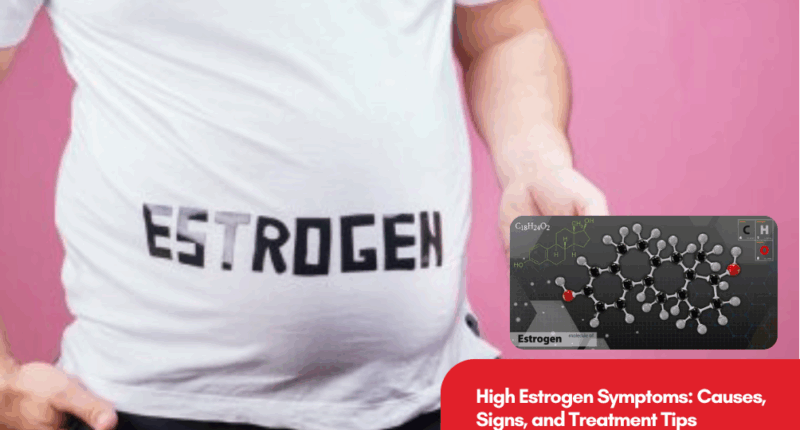Estrogen is one of the primary hormones responsible for regulating a woman’s reproductive system, but it also plays critical roles in bone health, mood regulation, and cardiovascular function. While estrogen is vital for these functions, having high levels of this hormone can lead to various symptoms and, sometimes, serious health issues. Understanding what causes high estrogen, recognizing the signs, and knowing when to get tested are essential steps for maintaining hormonal balance and overall health.

What Causes High Estrogen?
High estrogen levels can occur naturally due to life stages such as puberty and pregnancy or during the menstrual cycle’s peak phases. However, an excess beyond healthy ranges may stem from several causes:
- Overproduction by the ovaries or adrenal glands
- Impaired estrogen metabolism or elimination by the liver
- Exposure to external sources of estrogen-like compounds (xenoestrogens) found in plastics and personal care products
- Obesity, which increases estrogen production in fat tissue
- Certain medications, including hormone replacement therapy and some contraceptives
- Underlying health conditions such as polycystic ovary syndrome (PCOS), uterine fibroids, or estrogen-producing tumors
- Chronic stress affecting hormone regulation and adrenal function
Understanding these causes helps in identifying root problems and tailoring treatment approaches. As reproductive endocrinologist Dr. Irene Woo explains, high estrogen is often less about estrogen itself and more about its imbalance relative to other hormones like progesterone.
Drs. Woo and Tamara Guichard, prominent OB-GYN specialists, identify a range of signs indicating elevated estrogen levels or estrogen dominance—a state where estrogen is high relative to progesterone:
- Irregular, heavy, or prolonged menstrual bleeding
- Breast tenderness or fibrocystic breast lumps
- Mood swings, irritability, and anxiety
- Unexplained weight gain, especially around hips and thighs
- Fatigue and decreased sex drive
- Headaches or worsening premenstrual syndrome (PMS)
- Bloating and abdominal discomfort
- Hair thinning or loss
- Difficulty concentrating or “brain fog”
These symptoms reflect how estrogen impacts multiple systems, from reproductive organs to the brain. The symptoms may fluctuate with the menstrual cycle, often intensifying in the luteal phase when progesterone drops.
What Increases Your Estrogen Level?
Several factors contribute to increasing estrogen levels:
- Excessive alcohol impairs liver function, reducing estrogen breakdown.
- Chronic stress elevates cortisol, which disrupts hormone balance and reduces progesterone, amplifying estrogen’s relative effect.
- Obesity increases estrogen synthesis in fat cells.
- Dietary influences, including high intake of processed foods and animal fats.
- Exposure to environmental estrogen-mimicking chemicals such as bisphenol A (BPA) and phthalates found in plastics and personal care products.
- Certain health conditions and medications can raise estrogen levels or alter hormone ratios.
By modulating these factors, including adopting a healthier lifestyle and reducing environmental exposures, estrogen levels can often be better controlled.
Should You Get Your Estrogen Levels Tested?
Testing estrogen levels can offer valuable insight, especially if symptoms point toward hormonal imbalance. Blood tests can measure estradiol, estrone, and estriol, the three main forms of estrogen. However, testing is most useful when interpreted alongside symptoms and other hormone levels, particularly progesterone.
According to medical experts, testing is advised if:
- You have persistent symptoms affecting quality of life such as severe PMS, irregular periods, or unexplained mood changes.
- There is suspicion of specific conditions like PCOS, fibroids, or cancer.
- You are undergoing hormone replacement therapy or fertility treatments.
Routine testing may not be necessary for everyone, especially if symptoms are mild and lifestyle adjustments can be made safely. Consulting a healthcare provider ensures testing and treatment decisions are tailored to individual needs.
What Are The Main Symptoms of Estrogen Dominance?
Estrogen dominance specifically refers to a hormonal imbalance where estrogen is disproportionately high relative to progesterone, even if absolute estrogen levels are normal. This imbalance is common in perimenopause, PCOS, and stress-related hormone disruptions.
Main symptoms include:
- Cyclic breast tenderness or pain
- Mood swings and irritability
- Heavy menstrual bleeding or spotting between periods
- Weight gain primarily in the hips and abdomen
- Premenstrual migraines and headaches
- Fatigue and sleep disturbances
- Uterine fibroids and endometriosis flare-ups
Estrogen dominance can make women feel emotionally volatile and physically uncomfortable, often leading to distress and impaired daily functioning.
How Does a Woman Feel When Her Estrogen Is High?
When estrogen levels rise, women commonly experience a blend of physical and emotional changes. Physically, they may feel bloated and notice breast swelling or tenderness. Mood-wise, irritability, anxiety, and emotional sensitivity may become pronounced.
Women often describe feeling:
- Overwhelmed by mood swings
- Fatigued despite sufficient rest
- Uncomfortable abdominal bloating and fluid retention
- Frustrated by irregular or heavy menstrual bleeding
- Less interested in intimacy due to hormonal shifts affecting libido
These sensations come from estrogen’s broad effects on the nervous system, fluid retention, and reproductive tissues. Such symptoms can be subtle or intense, varying greatly among individuals.
What Diseases Are Linked to High Estrogen?
Elevated estrogen levels over time can increase the risk of several health disorders:
- Estrogen-sensitive cancers, such as breast, ovarian, and endometrial cancer
- Uterine fibroids, which cause heavy bleeding and pelvic pain
- Polycystic ovary syndrome (PCOS), characterized by hormonal imbalance and ovulatory dysfunction
- Blood clotting disorders increasing risk of stroke and deep vein thrombosis
- Hypertension and cardiovascular issues linked to estrogen’s vascular effects
Chronic estrogen excess stresses the body and disrupts hormonal regulation, contributing to these conditions. Early recognition and management of high estrogen can help mitigate these risks.
Treating Conditions Related To High Estrogen
Treatment strategies depend on the underlying causes but typically include:
- Lifestyle modifications: weight loss, stress reduction, limiting alcohol consumption, and avoiding xenoestrogen exposure
- Dietary changes to support liver detoxification and hormonal balance
- Hormonal therapies to restore progesterone levels or reduce estrogen effects
- Medications for specific conditions like fibroids or PCOS
- In rare cases, surgery may be necessary for estrogen-producing tumors
Integrative approaches combining medical treatment with lifestyle adjustments yield the best outcomes. Patients benefit from personalized care plans overseen by endocrinologists or gynecologists.
What Are 5 Estrogen Foods to Avoid?
Certain foods contain phytoestrogens or substances that may elevate estrogen levels in the body. To help balance hormones, experts recommend limiting these:
- Soy products (tofu, soy milk, soy protein) due to high isoflavones acting like estrogen
- High-fat dairy products linked to increased estrogen in some studies
- Red meat and processed meats, which may influence hormone metabolism
- Alcohol, which impairs liver function and estrogen breakdown
- Refined sugars and processed foods that promote inflammation and hormonal imbalance
Moderation rather than complete avoidance is advised, focusing on a nutrient-dense, whole foods diet that supports liver function and hormone health.
Also Read | How To Manage Post-Birth Control Syndrome: Doctors Explain Symptoms








